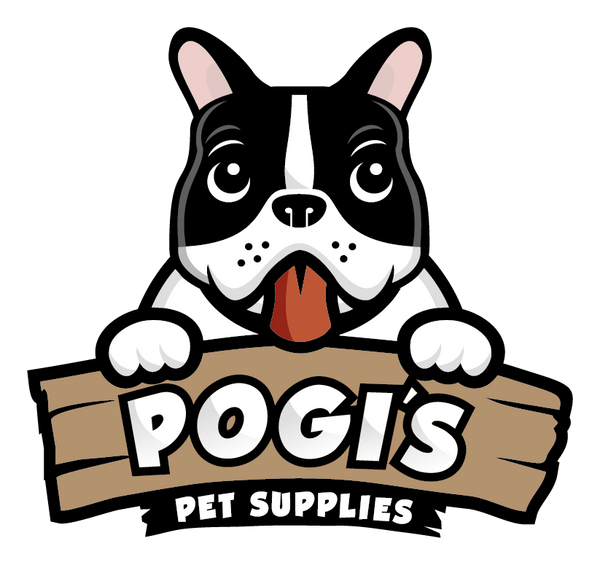Every pet parent knows that walks with a canine companion usually end with scooping poop, but what if your dog suddenly starts leaving behind more piles than usual? It can be confusing when a healthy dog’s stool routine shifts overnight.
Most adult dogs pass stool around one to three times a day, while puppies can go five or even six times daily. That’s totally normal for their developing digestive tract, but anything beyond these ranges may point to something worth paying attention to.
This guide breaks down the reasons why your dog might be pooping so much, when it’s just part of growing or eating habits, and when it could signal an underlying health issue. Stick around, we’ll even share tips on how to stay prepared with eco-friendly poop bags from Pogi’s.
10 Common Causes of Frequent Pooping in Dogs (And How to Tell What’s Normal)

1. Overeating or Excess Treats
A dog’s digestive health is closely tied to how much food they eat and how often. When a dog eats more than their body needs, the extra calories do not get absorbed but instead move quickly through the digestive tract. This often results in more frequent pooping than usual.
Think about those extra biscuits you slip under the table or the handful of crunchy treats during training sessions. While they may seem harmless, too many snacks can overload your dog’s stomach and lead to larger or more frequent stools.
Low-quality treats with fillers or by-products make this worse since they add bulk without offering much nutrition.
Many pet parents do not realize how easy it is to overfeed, especially if treats are not factored into daily portions. Using a pet calorie calculator or checking with your veterinarian can help you balance meals and snacks for a healthier dog poop schedule. This matters more than ever because nearly 60% of dogs in the United States are overweight, and overeating is one of the biggest reasons behind excessive pooping.
2. Sudden Diet Changes or Food Sensitivities
One of the quickest ways to disrupt a dog’s pooping habits is by changing what goes in their bowl too quickly. Dogs have delicate digestive systems, and even a simple switch from one kibble brand to another can upset the balance in their gut.
New proteins like chicken, beef, or lamb may seem harmless, but they can spark food sensitivities in some dogs. Intolerance to wheat, soy, or dairy is also common, and when these ingredients do not sit well, you will often see more frequent pooping, loose stools, or even mucus in the stool.
The key is patience. Diet transitions should happen over seven to ten days so the gut microbiome has time to adjust. This slow shift helps reduce the chances of excessive pooping and keeps your canine companion’s digestive health on track.
3. High-Fiber Diets
Not all frequent pooping signals a health emergency. Sometimes the culprit is right on the ingredient list. Fiber plays a big role in regulating a dog’s bowel movements, but when the amount tips too high, you may notice bulkier and more frequent stools.
Many “weight-control” and certain “grain-free” formulas use peas, legumes, or beet pulp to boost fiber content. While this helps dogs feel full, it often leads to excessive pooping that leaves pet parents puzzled.
For perspective, the recommended crude fiber content in most dry dog food hovers between 2.5 and 4.5 percent, depending on your dog’s breed and health profile. Anything far above that can push the digestive system to work overtime.
If your dog is otherwise healthy but pooping more than usual, take a closer look at the bag of kibble. A small adjustment in fiber levels may be all that is needed to bring your canine companion’s stool schedule back to normal.
4. Stress, Anxiety, or Overexcitement
A dog’s body does not just react to food; it also reacts to feelings. Stress or bursts of excitement can speed up the digestive process, leaving little time for proper absorption and causing more frequent defecation.
Life changes often set this off. Moving into a new home, long car rides, fireworks, or even short separations can all spark anxiety in dogs. These situations may come with other telltale signs, such as panting, pacing, or whining, before the sudden urge to poop.
The best approach is to keep your dog’s daily routine steady and to reward calm behavior during stressful moments. Small steps like quiet spaces, familiar toys, or positive reinforcement training can go a long way in easing anxiety and supporting healthier pooping habits.
5. Eating Non-Food Items (Pica)
Some dogs treat the backyard or even the trash can as if it were a buffet. When a canine companion munches on grass, dirt, rocks, or even cat litter, the digestive tract pays the price. These non-food items often irritate the stomach and intestines, which can cause frequent pooping, diarrhea, or even sudden stomach upset.
The risks go beyond irritation. Swallowing garbage or feces can expose dogs to intestinal parasites or bacterial infections, making the stool not only more frequent but sometimes loose or foul-smelling. Puppies and young dogs are especially curious, but even adult dogs may pick up the habit if bored or stressed.
For pet parents dealing with a habitual scavenger, supervision is key. Redirecting with toys, limiting access to tempting spots, or using a basket muzzle during outdoor play can help keep non-food items out of your dog’s stomach and keep their bowel movements more predictable.
6. Intestinal Parasites or Infections
Sometimes frequent pooping points to more than just a dietary issue. Parasites like roundworms, hookworms, whipworms, Giardia, and Coccidia can all disrupt a dog’s digestive health, often showing up as diarrhea, bloating, or stools with an unusually strong odor.
Weight loss in spite of a healthy diet is another red flag.
It is not only parasites that cause problems. Bacterial infections such as Salmonella or Clostridium can also upset the balance of the digestive tract and trigger more frequent bowel movements. These conditions may look like simple stomach upset at first, but they can become serious without treatment.
Puppies and outdoor dogs tend to be more vulnerable because they are curious explorers and often exposed to contaminated soil or water. Regular stool testing every six to twelve months helps catch intestinal worms or infections early, keeping your dog’s health and pooping habits in check.
7. Medical Conditions (IBD, Thyroid, Diabetes, and More)
When a dog’s pooping habits shift slowly over weeks or months, the cause is often more complex than diet or stress. Chronic changes in stool frequency can point to underlying medical conditions that affect the digestive system or the way the body processes nutrients.
Some of the most common health-related causes include:
-
Inflammatory Bowel Disease (IBD): Often leads to frequent pooping, vomiting, weight loss, and sometimes blood in the stool.
-
Hyperthyroidism: An elevated metabolism pushes food through the digestive tract faster, increasing bowel movements.
-
Diabetes: Can cause more frequent stools, usually alongside excessive thirst and urination.
-
Anal gland issues: Straining or discomfort may give the appearance of frequent pooping.
These conditions require prompt veterinary attention. Attempting home remedies without a diagnosis may worsen your dog’s health, so it is best to schedule an exam if you notice persistent changes in stool frequency.
8. Low-Quality Dog Food

If your dog is pooping more than usual and the stools look bulky or poorly formed, the problem may be sitting in the food bowl. Many bargain or lower-grade dog foods rely on fillers like corn, wheat by-products, or soy. These ingredients pass quickly through the digestive tract, leaving your pup with frequent poops but little nutritional benefit.
Since dogs cannot fully absorb nutrients from fillers, the body treats much of it as waste. The result is excessive pooping that keeps pet parents busy with the scoop but does little for a dog’s overall health.
When choosing a diet, check the label carefully. Quality dog food typically lists real meat as the first ingredient and keeps filler content to a minimum.
A diet built on whole proteins and balanced nutrients supports a healthy dog’s stool and usually means smaller, more manageable poops for you to pick up.
9. Age and Life Stage
How often a dog poops is not the same at every stage of life. Puppies, for example, process food at lightning speed because their digestive systems are still developing and their metabolisms are high. It is completely normal for puppies to poop five or even six times a day, often right after meals or naps.
Older dogs, on the other hand, may also experience changes in stool frequency but for different reasons. Senior dogs often develop sensitive stomachs, slower digestion, or mobility issues that make it harder to hold in stool.
Diets that include soft food or added fiber to support aging bodies can also increase bowel movements.
One of the simplest ways to keep track of these shifts is to maintain a poop diary. Recording when and how often your dog goes helps you notice patterns and catch any sudden changes that may signal a health concern for your furry friend’s life stage.
10. Increased Exercise or Hydration
A sudden uptick in walks, play sessions, or outdoor adventures can change more than just your dog’s energy levels. Physical activity naturally stimulates the digestive tract, moving food along faster and prompting more frequent defecation.
The same goes for hydration. When dogs drink extra water, their stool often softens, and the urge to go can happen sooner. This is usually a healthy sign that the body is staying flushed and hydrated.
If your dog’s appetite and energy remain steady, extra bathroom breaks after a long walk or active play are completely normal. In fact, many dogs poop immediately after exercise because the movement itself triggers bowel activity. For pet parents, this type of frequent pooping is simply part of life with an active canine companion and not a cause for concern.
When Frequent Pooping Is Normal — and When to See a Vet
1. What’s Normal Frequency?
Not every case of frequent pooping means something is wrong.
Most adult dogs have between one and three bowel movements each day, and that range is considered perfectly healthy. Puppies, with their developing digestive systems and faster metabolisms, may go as many as five or six times a day.
Other lifestyle factors also play a role. A high-fiber diet often produces bulkier stools, while extra exercise can speed up the digestive process and make your dog poop more often. In these cases, frequent pooping usually reflects changes in diet or activity, not underlying illness.
2. Red Flags That Require Veterinary Attention

Frequent pooping can be harmless in some cases, but there are clear signs that something more serious may be happening.
-
A sudden or extreme increase in stool frequency that does not match up with diet changes or activity levels.
-
Diarrhea lasting longer than a day or two, especially if it is watery or urgent.
-
Stool that contains blood, mucus, or has an unusual odor or color.
-
Additional symptoms such as vomiting, weakness, or visible discomfort when trying to poop.
-
Chronic changes in your dog’s pooping habits that last several days or longer.
If you notice any of these warning signs, it is best to get professional advice quickly. Even an online consultation with a veterinarian can help you decide whether urgent care is needed. Acting early helps protect your dog’s health and prevents small issues from becoming bigger ones.
3. Why It’s Important to Get a Vet’s Input
While some causes of frequent pooping are minor, others require professional diagnosis.
Conditions such as intestinal parasites or thyroid problems can often be identified with a simple stool sample or blood test, and treatment is usually straightforward.
Getting veterinary input early can prevent chronic digestive issues or more serious illnesses from developing. When you are unsure whether your dog’s pooping habits are normal, it is always safer to consult a vet rather than wait and hope the problem resolves on its own.
Staying Prepared: Why Compostable Poop Bags Matter for Responsible Pet Owners
1. Why Carry Compostable Bags?

Daily walks with your dog already mean carrying cleanup supplies, but when stools become more frequent, those bags can pile up fast. Each one you toss in the trash has a lasting impact if it is made of conventional plastic.
That is where Pogi’s Plant-Based Compostable Dog Poop Bags make a real difference. They are thick, leak-proof, and certified compostable under standards like DIN CERTCO, ASTM D6400, EN 13432, and AS 5810.
Whether you add them to a home compost system or they end up at an industrial facility, the bags break down completely without leaving behind microplastics.
For pet parents managing extra poops, switching to compostable bags is a simple way to keep the routine clean while making a positive choice for the environment.
2. Key Benefits of Pogi’s Compostable Bags
Choosing compostable bags is more than a convenience. It is a decision that makes every cleanup meaningful.
-
Plant-based and eco-friendly: Crafted from renewable materials that break down naturally, these bags allow pet parents to reduce plastic waste with every use.
-
Durable for every cleanup: Thick and leak-proof, they are strong enough to handle even the biggest poops without worry.
-
Certified compostable worldwide: Recognized under standards such as DIN CERTCO, ASTM D6400, EN 13432, and AS 5810, they deliver proven environmental benefits rather than vague claims.
When pet parents pick up after their dogs with Pogi’s compostable bags, a daily routine turns into an easy way to support both their furry friend and the planet.
Clean Walks, Healthy Pups, and a Cleaner Planet with Pogi’s
Every dog has their quirks, and bathroom habits are part of the story. Some pups go often because they are young and full of energy, others because of what they eat, and a few because their bodies need extra care. The important part is knowing when it is routine and when it deserves a vet’s attention.
The one thing that never changes is the cleanup. With Pogi’s Plant-Based Compostable Poop Bags, you can take care of business without adding plastic to the pile. Strong, reliable, and fully compostable, they make every walk lighter on the planet.
Turn daily scooping into something you actually feel good about. Choose Pogi’s Compostable Poop Bags and make clean walks part of your eco-friendly routine.
FAQs
How can I get my dog to poop less often?
Helping your dog poop less often usually starts with looking at diet and routine. If your dog’s stool frequency feels excessive, check whether they are eating too much food, low-quality kibble, or too many table scraps. A healthy diet with balanced fiber, quality protein, and healthy fats supports normal bowel movements. Regular exercise and reduced stress also help regulate a dog’s pooping habits. If your dog is still pooping so much without a clear reason, a vet visit and a stool sample can rule out parasites or digestive issues.
How many poops is too many for a dog?
Most adult dogs poop one to three times a day, while puppies poop five to six times daily. Anything beyond these numbers may suggest your dog’s digestive health is off balance. Frequent pooping is not always a red flag, especially if your dog’s stool looks normal and their energy and appetite are steady. But when pooping more than usual comes with watery stools, blood, mucus, or discomfort, it is time to consult a veterinarian to check for underlying health issues.
What foods cause dogs to poop more?
A dog’s diet plays a big role in how often they poop. High-fiber formulas, weight-control diets, and fillers like corn, wheat, and soy can all cause a dog to poop more. Too much calcium, undigested food, or even raw diets can also lead to more frequent pooping. Treats and dog table scraps often add unnecessary bulk to the digestive tract. Choosing the best dog food with high-quality ingredients and adjusting fiber levels to your dog’s life stage usually results in smaller, healthier stools.
Is my dog stressed, causing more poop?
Yes, stress and anxiety can absolutely make a dog poop more. Loud noises, car rides, vet visits, or separation from their owners can trigger stress-related bowel movements. Dogs under stress may show extra signs like pacing, whining, or panting, followed by urgent pooping. This happens because stress increases intestinal motility, pushing stool through faster. Pet parents can help by sticking to calm routines, reducing exposure to stress triggers, and offering positive reinforcement to support both their dog’s health and digestive comfort.
Does dry food make dogs poop more?
Dry dog food can cause more frequent pooping if it contains high amounts of fillers or fiber-heavy ingredients like peas, legumes, or beet pulp. Many low-quality dry foods are less digestible, meaning the dog’s body absorbs fewer nutrients and produces more waste. The best dog food for healthy dog poop is one with real meat as the first ingredient, balanced fiber, and healthy fats. If your dog’s stool looks bulky or frequent after switching to a new food, it may be time to reassess their diet.
Is my dog's breed prone to excessive pooping?
Some breeds do have more sensitive digestive systems than others, which can lead to more frequent pooping. Young dogs and smaller breeds often have faster metabolisms, so their dog poop schedule may be more active. Larger breeds, or those prone to digestive tract issues, can also have stool frequency that feels higher than average. Breed tendencies matter, but diet, exercise, and overall health usually play a bigger role. Tracking your dog’s pooping habits helps you notice whether the frequency is normal for their breed or a sign of something else.





